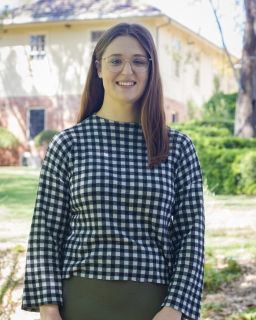Makayla-May Brinckley
All of these opportunities have been made available through the support networks that ANU provides: notably, the Tjabal Centre and ANUSA. I’m grateful to be afforded such opportunities.
Makayla-May Brinckley knew she wanted to go to ANU, and she knew what she wanted to study. What she didn’t know, was how she would be able to. Thanks to opportunities and persistence, she’s now graduating with two degrees, and is on a path she hopes will take her on to completing a PhD. She wants to pursue her passion for mental health and the wellbeing of Aboriginal and Torres Strait Islander people.
Graduating high school in the rural NSW town of Cootamundra, two hours west of Canberra, Makayla-May was eager to start university straight away.
“After high school, I wanted to come straight to university. My parents, however, were not able to financially support me, so they suggested I take a year off to work and earn money so I could support myself through university.”
Staying in her hometown, Makayla-May worked behind the bar at the local pub, and poured coffees as a barista. She worked hard, saving money in the hope that she would make it to university. But the waiting wasn’t easy.
“Working for a year when I already knew what I wanted to do at university and had already been accepted into my course was difficult; watching my friends go to university when I stayed home was hard.”
During her year off, Makayla-May learnt about opportunities that would make it easier for her to reach ANU. She found out that her high school, as a low SES regional school, had an early entry partnership with ANU. With a principal’s recommendation, she gained a conditional early entry through this scheme. She also gained a Commonwealth Scholarship, and Abstudy once she arrived.
These opportunities didn’t mean university was easy, she balanced work with full time study, but they did remove the essential barriers.
“I’m grateful that I was able to come to university and graduate as I know many aren’t as lucky.”
While at ANU, Makayla-May has been fortunate to enjoy many opportunities outside the classroom. In 2017 she was elected Indigenous Officer for the ANU Students Association. She worked on the organising committee for a national conference for women and non-binary students.
She was selected to travel to Canada for the World Indigenous People’s Conference on Education, an opportunity made possible by funding from the ANU Fund.
“I was able to learn from incredible First Nations speakers, and also present with other ANU students about our experiences as Indigenous students in Australia.”
This year she attended an international conference in New Zealand, learning about different ways to conduct research that is culturally safe and community driven. She credits the support of ANU and student bodies for helping her access and make the most of these opportunities.
“All of these opportunities have been made available through the support networks that ANU provides: notably, the Tjabal Centre and ANUSA. I’m grateful to be afforded such opportunities.”
For future students, Makayla-May encourages them to seek out support networks, and make use of the support resources available. In particular she praises the support of the Tjabal Indigenous Higher Education Centre at ANU.
“My advice to Aboriginal and Torres Strait Islander students is to seek out Tjabal and all it has to offer. Academically, culturally, and personally, Tjabal has really gotten me through my Bachelor degree at ANU. The assistance is immense and the opportunities provided are incredible. More generally, there is a place for all students at ANU to find academic and pastoral support. It is these connections that make your experience at university safe, healthy, and worthwhile.”
Makayla-May was attracted to ANU because it was close enough to stay connected to family in Cootamundra, but far enough to let her forge her own path and a new chapter in life. Choosing to study and Arts (Gender and Cultural Studies/Australian Indigenous Studies) and Science (Psychology) has let her explore an area she is passionate about and is close to her heart.
“I have a passion for mental health and wellbeing health care. I want to work with Aboriginal and Torres Strait Islander people to give back to this community that has given so much to me and enabled me to study and work in a variety of amazing places. I also recognise that our mob is often left without appropriate services and see this as a gap I can help fill. I always felt a pull towards the mental health sector, and since recognising the huge lack of culturally appropriate, affordable, and accessible mental health care I knew I was meant to work in this field."
Makayla-May hopes that through paths in clinical psychology or community-driven research, she can help place her mob at the centre of their health care, and bridge divides that hold back progress. She has applied study Honours next year, completing a thesis on Indigenous health between the Research School of Psychology and the Research School of Population Health. Her ultimate goal is to complete a PhD.
“After completing a PhD I can then either go into psychological research, or practice as a psychologist. No matter the pathway, I’m focused on working for Aboriginal and Torres Strait Islander communities in ways that is the most beneficial to them.”

